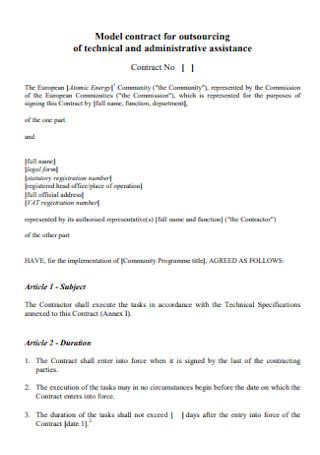Legal Aspects of Outsourcing Contracts

Outsourcing has become an integral part of the tech industry, enabling businesses to tap into specialized skills and resources without the need for extensive in-house operations. However, when it comes to outsourcing, it is crucial for both the client and the service provider to have a comprehensive understanding of the legal aspects surrounding outsourcing contracts. This article explores key legal considerations that businesses should bear in mind when outsourcing tech services.
1. Contract Clarity and Essential Elements
When entering into an outsourcing agreement, it is imperative to draft a well-defined contract that encapsulates the expectations, obligations, and limitations of both parties. The contract should clearly outline the scope of work, deliverables, timelines, pricing, payment terms, and any other essential aspects related to the outsourcing project.
Additionally, contracts should include terms addressing intellectual property rights, confidentiality agreements, dispute resolution mechanisms, termination clauses, liability limitations, and indemnity provisions. Ensuring the inclusion of these fundamental elements will provide a solid legal foundation for the outsourcing arrangement.
2. Compliance with Data Protection Regulations
In today’s digital age, data protection has become a critical concern in tech outsourcing contracts. Businesses operating in various jurisdictions must comply with applicable data protection regulations, such as the European Union’s General Data Protection Regulation (GDPR) or the California Consumer Privacy Act (CCPA).
Outsourcing contracts should detail the responsibilities of both parties in protecting personal and sensitive data. It is essential to address data access, storage, transfer, and deletion protocols to protect confidential information. Compliance with data protection laws should be clearly specified, along with the procedures to handle any data breaches or security incidents.
3. Intellectual Property Rights (IPR)
Intellectual property is a valuable asset in the tech industry. When outsourcing, it is essential to establish ownership and usage rights of the intellectual property created during the project. The contract should explicitly define the ownership of pre-existing intellectual property, as well as any IP developed during the outsourcing engagement.
Addressing contractual terms related to IP rights, licenses, royalties, and restrictions will help avoid any disputes or claims over ownership of innovative technologies or creative works produced during the outsourcing project.
4. Dispute Resolution Mechanisms
Outsourcing contracts should include clearly defined dispute resolution mechanisms to address any potential conflicts that may arise during the contract period. Such mechanisms can include negotiation, mediation, arbitration, or litigation in specific circumstances.
It is advisable to specify the jurisdiction and the applicable law governing the outsourcing contract, ensuring that both parties have agreed on a fair and mutually acceptable resolution process. Constructing a robust dispute resolution clause helps reduce legal uncertainties and minimizes the risk of expensive and time-consuming legal proceedings.
5. Termination and Transition
Circumstances may arise where the outsourcing agreement needs to be terminated prematurely or upon completion of the project. Therefore, it is crucial to include termination provisions in the contract that outline the conditions, notice periods, and consequences of early termination.
Furthermore, contracts should consider the post-termination phase, including mechanisms for the orderly transfer of work, return of confidential information, and resolution of any outstanding disputes or financial obligations between the parties.
Conclusion
When venturing into outsourcing contracts in the tech industry, businesses must pay close attention to the legal aspects to protect their interests and maintain effective relationships with their service providers. Drafting clear, comprehensive agreements that cover essential elements such as scope, pricing, data protection, intellectual property, dispute resolution, and termination provisions ensures a solid legal foundation for successful outsourcing arrangements.
By addressing these legal considerations upfront, companies can mitigate risks, protect their assets, and ensure the seamless execution of tech outsourcing projects.